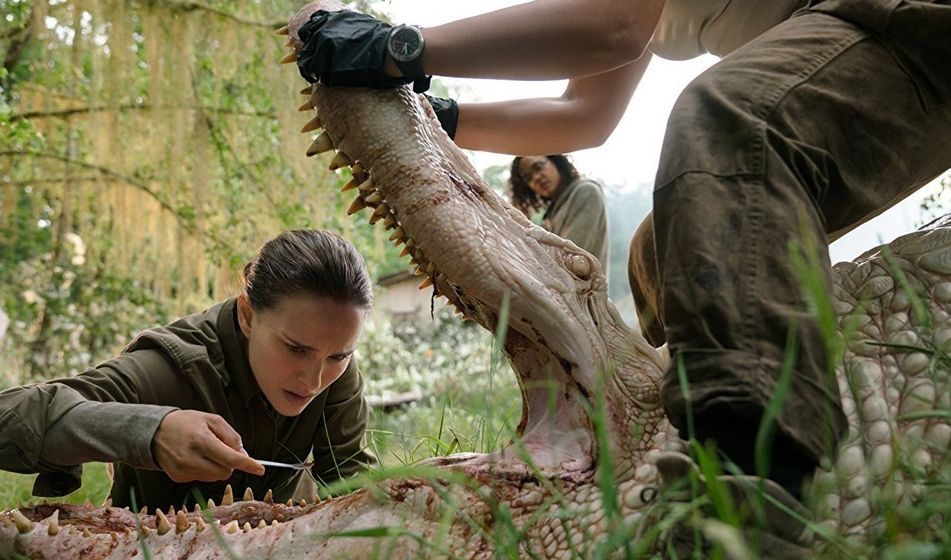
'Annihilation' Review
 Alex Garland’s 'Annihilation' is tapping into the highest echelons of science fiction, so much so that its distributor, Paramount, wanted nothing to do with and all but jettisoned into the hands of a streaming service. Adapted from a novel by Jeff VanderMeer, 'Annihilation' is overdosed on ambiguity and an intellectual vortex that transports us into a puzzling dimension. It provides one of the few pure cinema experiences of 2018 so far, even if to try to decipher its hypotheses is a mind-bending exercise in futility. But I’m going to try.
Alex Garland’s 'Annihilation' is tapping into the highest echelons of science fiction, so much so that its distributor, Paramount, wanted nothing to do with and all but jettisoned into the hands of a streaming service. Adapted from a novel by Jeff VanderMeer, 'Annihilation' is overdosed on ambiguity and an intellectual vortex that transports us into a puzzling dimension. It provides one of the few pure cinema experiences of 2018 so far, even if to try to decipher its hypotheses is a mind-bending exercise in futility. But I’m going to try.
The first film that came to mind after seeing 'Annihilation' was Darren Aronofsky's 'mother!' – the last slice of unrefined brilliance I had seen before this film. But whilst 'mother!' had a compelling reverential and self-destructive symbiosis with its source material; the Bible, Garland’s work here has an ever so subtle nod to the biblical text, but with the ultimate aim establishing a new order anchored on science in the ultimate cinematic retort to creationism.
Much like 'mother!' there is an underlying affinity for nature and humanism more than an outright contempt for all things biblical. 'Annihilation' overtly flies the flag for science on more than one level. Our protagonist here is Lena (Natalie Portman), a biologist, and along with the other key characters, most of whom are scientists, are presented as the solution to the perplexing mystery ushered into earth by the smallest and most peaceful of meteors, birthing what will come to be known as the “Shimmer.”
Like most of the film, 'Annihilation' opens with questions and like most of the film, answers are hard to come by. We find Lena being interrogated by a man in a hazmat suit (Benedict Wong). She has spent some time in the Shimmer and he asks simple questions about her experience: what she ate, what happened to most of her team – but answers are hard to come by.
After the opening, we flash back: Lena’s husband, Kane (Oscar Isaac), a soldier, is presumed dead after venturing into the Shimmer with a team a year earlier. Lena is weighed down by grief, among other things, as she goes about her life as a professor at Johns Hopkins. We see her demonstrate to her students how life essentially birthed forth from a single cell “alone on planet earth, perhaps alone in the universe.” She goes home, after rebuffing a colleague’s invitation for a hangout, to wallow in her memories and weep on her couch. But in an almost surreal moment, later on, her husband reappears. Tears of grief turn to tears of joy.
We are only seven minutes in when some more maybes, I think sos and I don’t knows about the Shimmer come our way. Kane cannot recall a single detail about the mission. But we get an important foreshadowing detail with which we could use to contextualise the science and mysteries of this film; a simple close up of a glass of water and the refracted shot of Lena stroking Kane’s hand behind it.
It’s the first time we’re meeting Kane but we can tell he is a different man than the one Lena married. He’s off mentally and before long he is coughing blood and in a seizure. The couple soon find themselves at a covert facility where a psychologist with a supervillain name, Dr. Ventress (Jennifer Jason Leigh), tells Lena that her husband is on the verge of death.We also get some explanation about the Shimmer. From the small meteor, we see in the first few minutes of the film, it has developed into an expanding dome-like barrier with a lighthouse as its epicentre near some swamps in Florida. The idea of refraction comes into play with attempts to describe the aesthetics of the shimmer. It looks like a manifestation of the basic school explanation we got about the results of light travelling through a prism. It looks like a dazzling viscous entity with an assortment of colours that creeps and mesmerises in equal measure.
There is a team of scientist busying themselves in the facility to no avail. No one knows what the Shimmer is about. Ventress supposes it could be a religious event, an extra-terrestrial event or something from a higher dimension. Before Kane, nothing had come back from the Shimmer. He’s a waning aberration. Despite this, Ventress herself will be leading another team into the Shimmer and Lena, who has a military background, volunteers to join; adding to Anya, a paramedic (Gina Rodriguez); Josie, a physicist (Tessa Thompson) and Cass, a geomorphologist (Tuva Novotny).
Why it’s an all-female team, we don’t know. I guess that is a question the source material may answer. But on they go into the Shimmer, with their heavy backpacks and assault rifles in hand, as the horror elements of the film slowly take hold. The insides of the Shimmer are characterised by heavily mutated fauna and plant life. Nature at its most vibrant and tactile is an ever-present part of the way Garland crafts our visual experience in the Shimmer. In some other dimension, there is a collaboration between Werner Herzog and David Cronenberg and it looks just like this; marrying the gorgeous and the grotesque.
The inner workings of the film is all Garland and his intriguing screenplay. To go into the Shimmer is to enter a quasi-dream state. Cut to the team waking up at their camp and they don’t remember a single thing after stepping through the soap-bubble-like barrier. They think they’ve been in for four days. They aren’t sure and suddenly our only surrogates become somewhat unreliable. The threats, however, are real and ever-present.
First, it’s a giant albino-ish alligator that almost snaps Josie in half. The nerves start to kick in as the dread becomes very apparent. They find an incredibly disturbing recording left by an earlier team that is not for the faint-hearted. This followed by the discovery of some sort of moulding fungi engrossed corpse that is a feat in remarkable art design; beautiful until Garland offers up some close-ups. Then my tummy began to lurch. There’s also this attack by a giant vicious haunting bear that I would draw if asked to describe the purest incarnation of death.
It’s clear the environment is hostile but there is much more intrigue in the Shimmer that unravels character and accentuates some primal sensibilities. To begin with, all the characters are damaged in one way or the other. For some its loss, for some guilt. There’s physical and mental illness in there too. It isn’t the most compelling emotional core but there is enough depth to keep us interested as they make their way to the destination. The performances remain up to task and Rodriguez as Anya really impresses as she melts down at some point, ushering in a memorable sequence, in which Garland puts the clamps on and ramps up disquieting intensity to terrifying results, justifying the film’s horror tag.
As expected with a film that could have easily had “I don’t know” as its tagline, the conclusion offers more questions and very little answers. The obtuse denouement still serves up another bewildering sequence at first watch that morphs into something truly poetic subsequently.
Garland is definitely guilty of overindulging, especially when it becomes clear the film is to remain open-ended. We are sold on the idea of destination that ultimately offers little by way of finality. I won’t begrudge those view this as a failing.
But it appears this way because Garland is telling a story about beginnings. It’s a weird paradox that is not 100 percent earned but undeniably stimulating. Despite the horrors that lurk within the Shimmer, it’s hard to not look at it and think Garland is crafting his own version of the Garden of Eden – a new cradle of life. His is a vision of elaborate flowers blooming in earnest in every colour imaginable. There are the trees shaped like humans and there is a certain peace and stillness that connotes perfection, at least in our director’s eyes.
Staying in the lane of paradoxes, there is a lot of science at work that science really can’t explain. It’s a melding of biology and the cosmic in ways that make no attempt to adhere to logic. This is a far cry from Garland’s previous film, 'Ex Machina', which probes at the core beats that make us human, warming and harrowing in equal measure.
'Ex Machina' is pretty darn cerebral but also very concise. On the other hand, ambiguity remains the calling card for 'Annihilation'. Garland is pretty consistent in this regard. Lena is still uttering “I don’t know” to questions she is confronted with when the film is about to end. At least, by this point, we have all the pieces of the puzzle, or rather intricate wondrous Lego pieces with which we can craft something complete.
-


